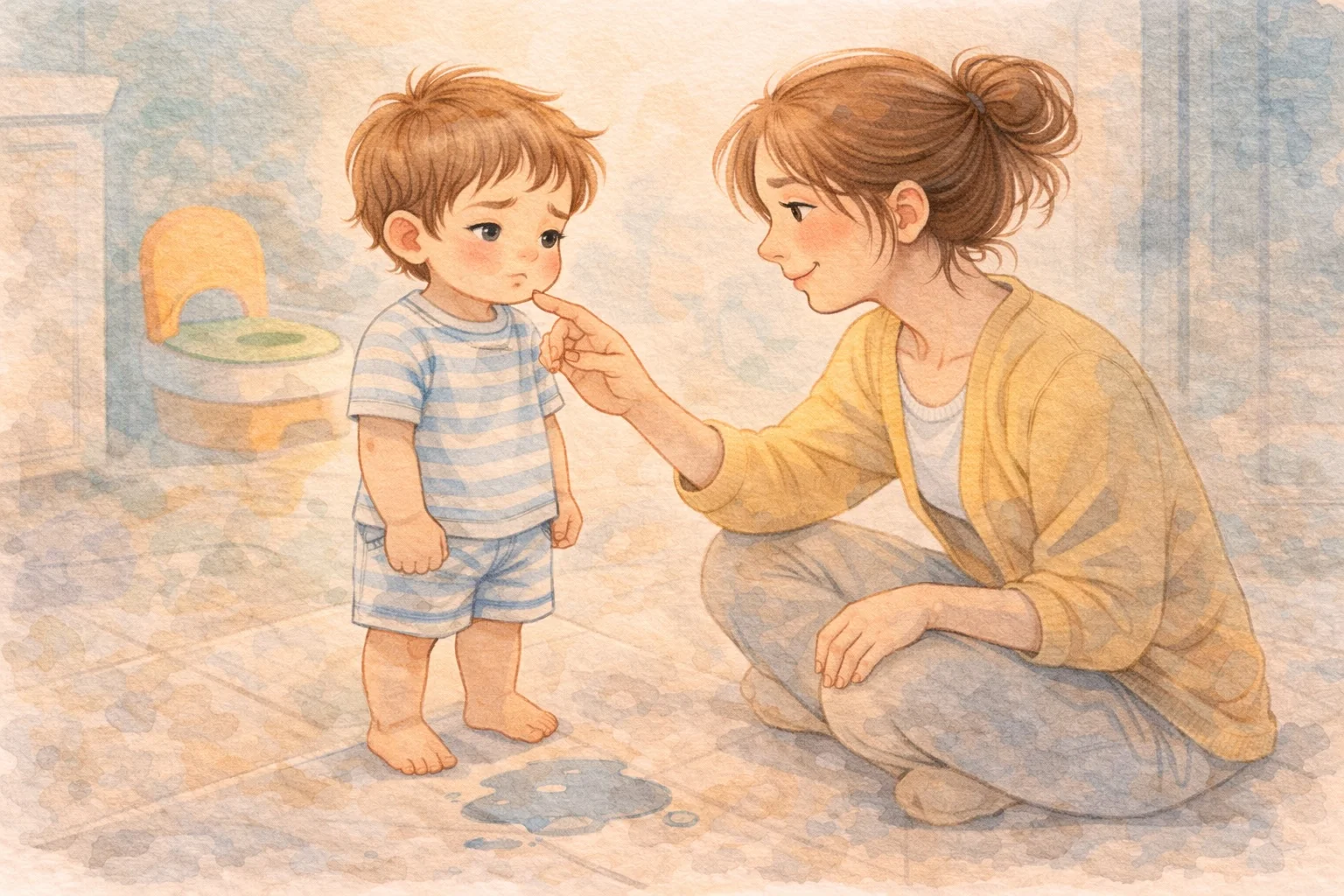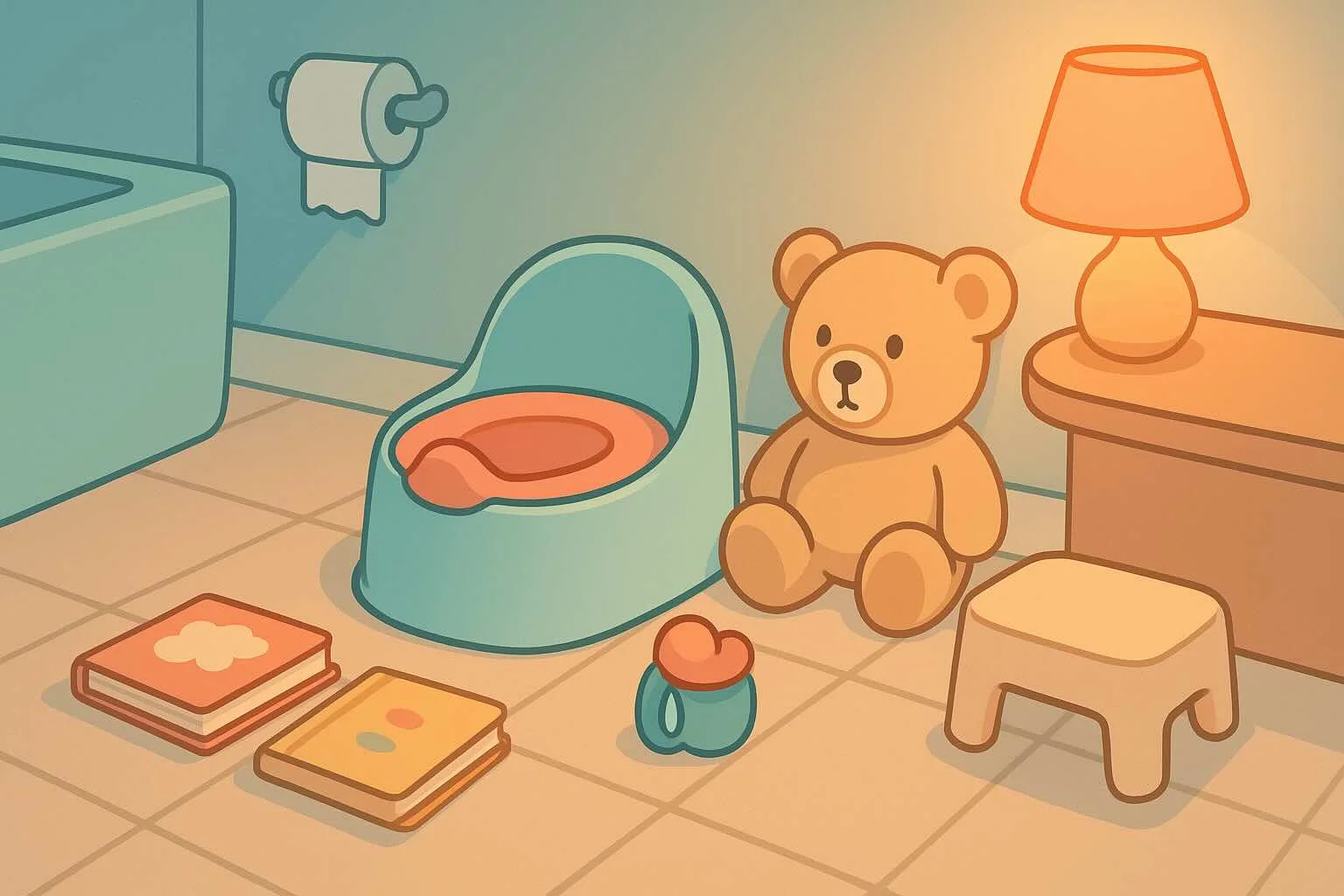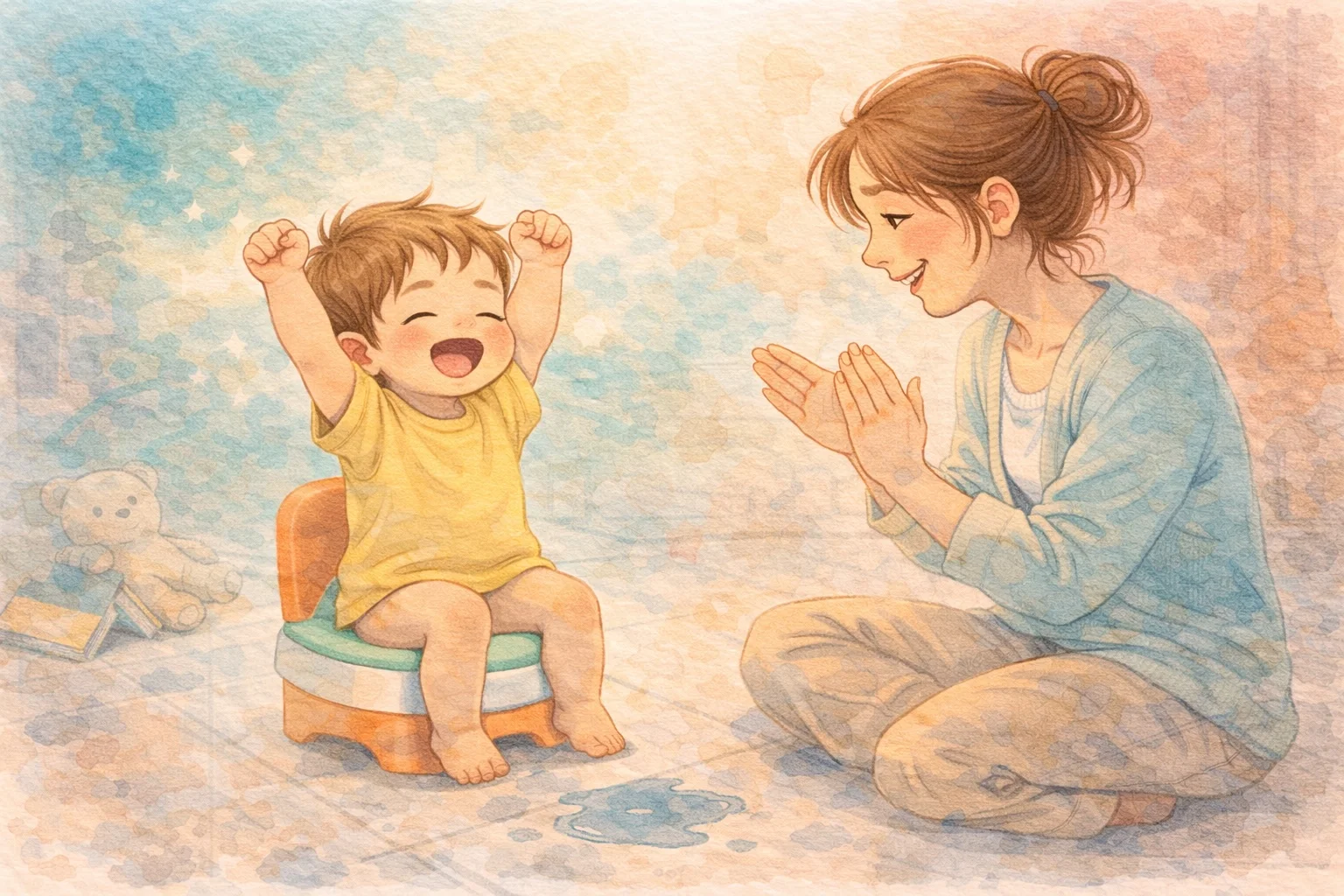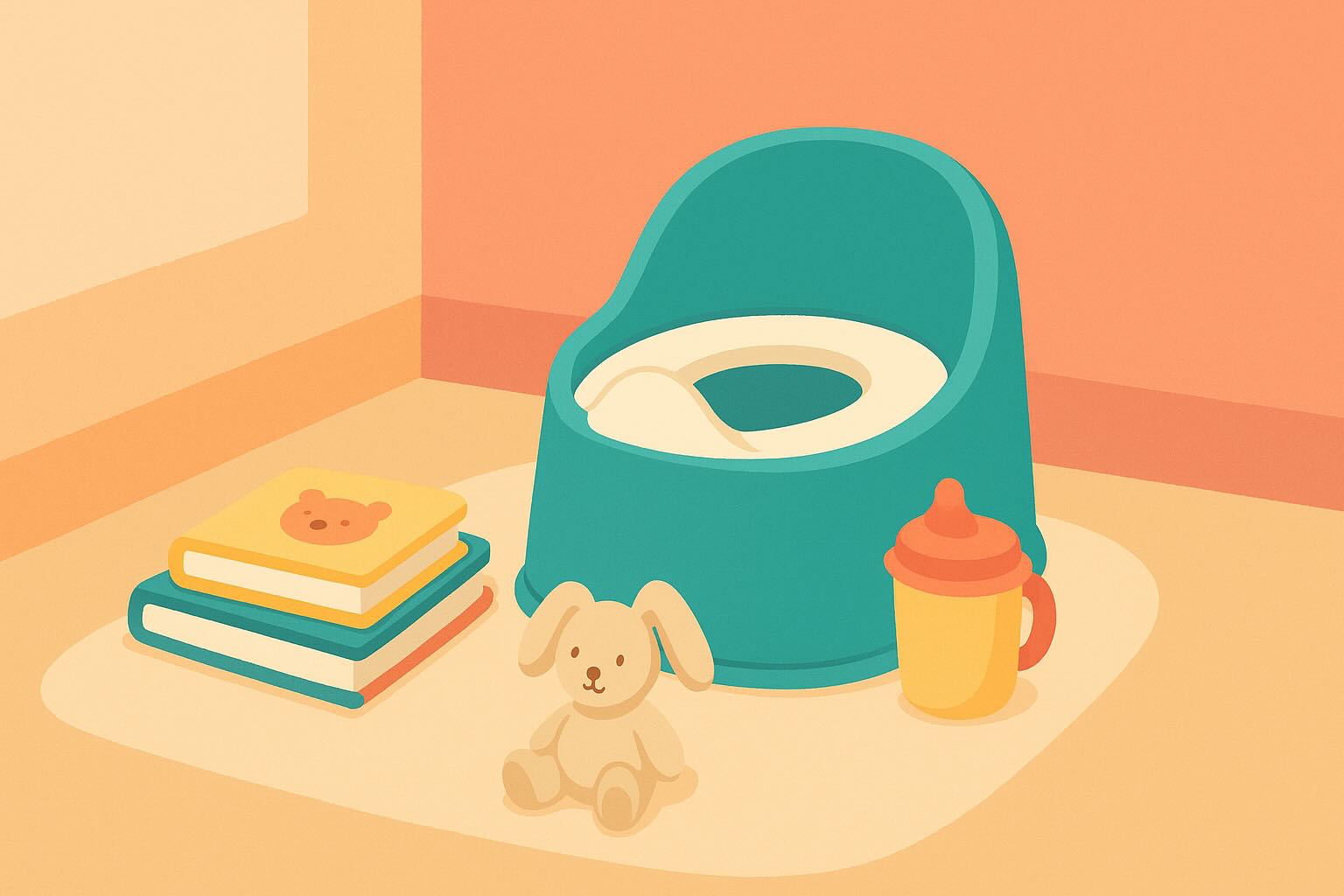Potty Training Regression: Complete Guide for Parents (Why It Happens & What to Do)


"We've been accident-free for six months. SIX MONTHS. And then last week, out of nowhere, he peed his pants three times in one day. Now it's happening daily. Did he forget how? Is he being lazy? I don't understand—he KNOWS how to use the potty!"
Yes, he does know how. And no, he didn't forget.
What's happening isn't about potty skills at all. It's about stress.
Potty training regression—when a previously reliable child suddenly starts having frequent accidents—is one of the most frustrating experiences for parents. You thought this chapter was closed. You celebrated the victory. And now you're back to cleaning up accidents, washing extra laundry, and wondering what went wrong.
Here's what you need to understand: Regression isn't failure. It's information.
It's your child's body communicating: "Something in my life is overwhelming me right now, and I don't have the capacity to manage this skill AND process my stress."
In this guide, you'll learn:
- The 7 most common regression triggers (and how to identify which applies)
- Why regression is a stress response, not defiance
- How to respond with compassion instead of punishment
- Returning to basics without shame
- Timeline expectations: how long does it usually last?
- Preventing future regressions
Let's start by understanding what's really happening in your child's brain during regression.
- ✓Regression is a stress response, not defiance — your child's brain literally doesn't have the resources to manage this skill right now
- ✓30-50% of children experience potty regression at some point, especially around major life changes
- ✓Punishment and pressure make regression worse and last longer
- ✓Most regressions resolve within 2-8 weeks when you address the underlying stressor and respond with compassion
Regression as Stress Communication: What's Really Happening
The brain science of regression:
When children experience stress or overwhelm, their nervous system shifts into survival mode. In this state:
- Prefrontal cortex goes offline: The part of the brain responsible for executive function (remembering to use potty, recognizing body signals, interrupting play to go) literally loses capacity.
- Survival brain takes over: Fight, flight, freeze responses dominate. Managing basic emotions becomes the priority.
- Recently learned skills deteriorate first: Potty independence is a relatively new skill (compared to walking, talking), so it's among the first to be affected when capacity is limited.
Translation: When your child has accidents during regression, it's not that they "forgot" how or are "being lazy"—their brain literally doesn't have the resources to manage this skill right now.
Think of it like your own stress response: when you're overwhelmed, you might forget where you put your keys, skip meals, or struggle to focus on work. Your child's "forgetting" to use the potty is the same phenomenon—stress reduces functional capacity.
For more on how stress affects child development, see our transitions and change guide.
The 7 Most Common Regression Triggers
Identifying what's causing the regression helps you address it effectively.
1. New Sibling Arrival
Why it triggers regression:
- Massive shift in family dynamics and attention
- Child experiences grief for "old normal"
- Identity crisis: "Baby wears diapers, maybe I should too"
- Competition for parental attention
- Actual biological stress response (elevated cortisol)
What it looks like:
- Regression starts weeks before or after baby's arrival
- Child might explicitly say "I want to be a baby"
- Accidents often occur when parent is feeding/caring for baby
- May also regress in sleep, eating, or other independence skills
How to respond:
- Make diapers available without shame: "You can use potty or diapers—you decide."
- Carve out special one-on-one time: "This is OUR time, just you and me."
- Involve them in baby care: "I need your help! You're the expert big sibling."
- Explicitly reassure: "You're my [name]. Nothing changes how much I love you."
For complete strategies, see our potty training with new baby guide.
2. Starting Preschool or Daycare
Why it triggers regression:
- Separation from parents creates anxiety
- Unfamiliar bathroom environment
- Fear of accidents in front of peers
- Different expectations/routines
- Social comparison and performance pressure
What it looks like:
- Accidents start 1-2 weeks before or after school begins
- More accidents at school than at home (or vice versa)
- Child expresses anxiety about school bathroom
- May also see clinginess, sleep disruption, emotional meltdowns
How to respond:
- Visit school bathroom during orientation
- Practice asking for help: "If you need bathroom at school, you can say 'I need help'"
- Communicate with teachers about your child's specific needs/signals
- Increase support at home: earlier bedtime, more connection time
- Expect 2-4 week adjustment period with more accidents
3. Moving Homes or Major Environmental Change
Why it triggers regression:
- Loss of familiar bathroom cues and routines
- General anxiety about change and loss of control
- Disrupted schedule during moving process
- Processing grief for old home/neighborhood
What it looks like:
- Accidents begin during packing/moving process or first weeks in new home
- Child seems anxious or clingy overall
- Difficulty with other routines (sleep, eating)
- Asking about "old house" frequently
How to respond:
- Set up bathroom in new house as early as possible
- Use same potty seat/stool from old house (familiar items)
- Give tour: "Here's where bathroom is. Let's practice walking there."
- Increase reminders during transition period
- Validate their feelings: "Big changes are hard. Your body needs extra help right now."
4. Parent Separation, Divorce, or Family Conflict
Why it triggers regression:
- Profound sense of instability and insecurity
- Fear, confusion, grief about family structure
- Hypervigilance to parents' emotional states
- Loss of routine and predictability
What it looks like:
- Regression starts around time conflict increases or separation announced
- Child may also show sleep problems, aggression, withdrawal, or anxiety
- Accidents worse during transitions between households
- Fear of abandonment ("If Daddy left, will you leave too?")
How to respond:
- Maintain consistent routines wherever possible
- Reassure stability: "You are safe. We both love you. Nothing changes that."
- Don't use potty regression as weapon in conflict with ex-partner
- Consider child therapist for processing grief and anxiety
- Temporarily lower expectations and increase support
5. Illness, Medical Procedures, or Hospitalization
Why it triggers regression:
- Physical discomfort disrupts body awareness
- Trauma from medical experiences (especially related to body autonomy)
- Medication side effects affecting bladder/bowel control
- Energy depletion from fighting illness
- Loss of routine during illness/recovery
What it looks like:
- Accidents start during or immediately after illness
- Child expresses fear or anxiety about body
- Possible pain during urination/defecation (UTI, constipation)
- Regression persists beyond recovery from illness
How to respond:
- Consult pediatrician to rule out medical causes (UTI, constipation)
- Temporarily make diapers available during illness: "Your body is working hard to feel better."
- Return to basics gradually during recovery
- Address trauma if medical procedure was involved (consider play therapy)
- Be patient—medical regression often takes longer to resolve
6. Trauma or Scary Events
Why it triggers regression:
- Nervous system stuck in survival mode
- Loss of sense of safety and control
- Hypervigilance taxes all cognitive resources
- Developmental regression across multiple areas
What it looks like:
- Regression follows specific traumatic event (accident, abuse, witnessing violence, natural disaster)
- Child shows other trauma signs: nightmares, aggression, withdrawal, hypervigilance, re-enactment play
- Extreme fear or refusal around bathroom/potty
- Regression in multiple developmental areas
How to respond:
- Prioritize safety and connection over potty independence
- Make diapers available with zero pressure
- Seek trauma-informed child therapist immediately
- Don't force bathroom time if it triggers fear
- Focus on regulating nervous system: predictability, connection, co-regulation
For trauma responses in children, see our fear and anxiety guide.
7. Developmental Leaps and Big Changes
Why it triggers regression:
- Brain resources redirected to new skill development
- Temporary disorganization during growth
- Testing boundaries as part of healthy development
- Processing increased independence and autonomy
What it looks like:
- Regression coincides with major developmental leap (language explosion, physical skill mastery)
- Child seems generally more dysregulated (tantrums, sleep disruption, eating changes)
- Accidents feel random, not tied to obvious external stressor
- May be testing: "What happens if I don't use potty?"
How to respond:
- Recognize this as temporary developmental reorganization
- Return to basics without judgment: more reminders, simpler clothing
- Stay consistent and matter-of-fact
- Wait it out—these regressions typically resolve within 2-4 weeks
For more on developmental leaps, see our tantrum management guide.
The "Regression Is Information" Framework
When accidents start happening again, shift from "How do I fix this?" to "What is this telling me?"
Step 1: Identify the Trigger
Ask yourself:
- What major changes have happened in the past 1-2 months?
- What's different in my child's life right now?
- Is there stress I'm not seeing (that my child might be experiencing)?
- Have there been changes in routine, relationships, or environment?
Sometimes it's obvious (new baby just arrived). Sometimes it's subtle (parent started new job with different schedule).
Step 2: Validate the Stress
To your child:
"I notice you're having accidents again. Sometimes when big things happen [name the stressor], our bodies need extra help. That's okay. You're learning and growing, and I'm here to help you."
To yourself:
- This isn't failure (theirs or yours)
- Regression is normal developmental response to stress
- Addressing the stress is more important than the accidents
Step 3: Address the Root Cause
For new sibling: Increase one-on-one time, involve in baby care, reassure connection
For school transition: Visit school bathroom, practice asking for help, communicate with teachers, expect adjustment period
For family conflict: Maintain routines, reassure stability, consider therapy
For trauma: Prioritize safety/connection, seek professional support, remove pressure
For developmental leap: Recognize temporary nature, provide extra support, wait it out
Step 4: Return to Basics Without Shame
What "return to basics" means:
- More frequent reminders: "Let's check if your body needs the potty before we leave"
- Simpler clothing: Elastic waists, no overalls/zippers
- More accessible potty: Small potty in playroom during stressful period
- Involve in cleanup: Neutral, not punitive
- Lower expectations temporarily
You know better than this! You were doing so well — what happened? Only babies have accidents.
Sometimes when big things happen, our bodies need extra help. Let's clean up together. I'm here to help you.
Step 5: Increase Connection and Support
During regression, prioritize:
- More physical affection: Hugs, cuddles, lap time
- Special one-on-one time: Even 10 minutes of focused attention matters
- Emotional validation: "You're dealing with a lot right now. I see you."
- Patience: "We're going to get through this together."
How Long Will Regression Last? Timeline Expectations
The honest answer: It depends on the trigger and your response.
Typical Timelines
Minor stressors (schedule change, mild illness):
- With supportive response: 1-3 weeks
- With punitive response: 4-8 weeks or more
Major transitions (new sibling, starting school, moving):
- With supportive response: 3-8 weeks as child adjusts
- With punitive response: 2-6 months with potential for entrenchment
Trauma or ongoing stress:
- With professional support: Several months, gradual improvement
- Without support: Can persist indefinitely and create long-term issues
Factors That Shorten Regression Duration
- Identifying and addressing the trigger (vs. ignoring underlying stress)
- Compassionate, shame-free response (vs. punishment or pressure)
- Temporarily increasing support (more reminders, easier clothing)
- Maintaining connection (prioritizing relationship over compliance)
- Professional help when needed (therapy for trauma, medical for physical issues)
When to Seek Medical Evaluation
If regression persists beyond 2-3 months despite supportive approach, consult pediatrician to rule out:
- Urinary tract infection
- Chronic constipation
- Diabetes (sudden onset with increased urination)
- Neurological issues
- Sexual abuse (sudden onset with other concerning behaviors)
Don't wait if: Regression includes blood in urine/stool, severe pain, fever, or concerning behavioral changes.
Preventing Future Regressions
You can't prevent all regression (life happens!), but you can reduce frequency and severity:
1. Build Stress Resilience
Teach emotional regulation skills:
- Name feelings: "You're feeling frustrated. Frustration is hard."
- Model coping: "When I feel overwhelmed, I take deep breaths."
- Provide regulation tools: quiet space, sensory items, movement breaks
2. Prepare for Predictable Stressors
When you KNOW big change is coming (new baby, move, school start):
- Talk about it in advance: "In two months, we're moving to a new house. Let's talk about what that means."
- Read books about the transition
- Visit new environments before transition when possible
- Explicitly say: "Big changes can be hard. Your body might need extra help during that time, and that's okay."
3. Maintain Connection During Stress
Daily connection rituals:
- Morning cuddle time
- After-school reconnection (don't jump to questions, just BE together)
- Bedtime routine with individual time
- Weekly special one-on-one activity
4. Notice Early Signs of Overwhelm
Before regression happens, watch for:
- Increased tantrums or emotional reactivity
- Sleep disruption
- Changes in appetite
- Clinginess or withdrawal
- Decreased frustration tolerance
Early intervention: When you notice these signs, increase support preemptively—more connection, simpler expectations, regulated schedule.
5. Keep Communication Open
For older kids (3.5+):
- "How are you feeling about [upcoming change]?"
- "Is anything worrying you?"
- "Your body is yours. If you need extra help with potty, you can tell me."
The Bottom Line on Potty Training Regression
Regression isn't failure. It's not your child being "difficult" or "lazy." It's not evidence that you did something wrong during initial training.
Regression is communication: "I'm stressed and overwhelmed right now."
Your job isn't to push through it with consequences or pressure. Your job is to:
- Listen to what the regression is telling you about your child's stress
- Address the root cause rather than just the symptom
- Respond with compassion instead of punishment or shame
- Temporarily increase support while they navigate the stressor
- Maintain connection through the challenging period
When you do this, regression resolves faster—AND you teach your child something profound:
"When you're struggling, I increase support. I don't withdraw love or add pressure. I'm here with you, through the hard things."
That lesson—about unconditional support during stress—is worth far more than a few weeks of accidents.
Because potty training is temporary. But the message you're sending about how you show up when they're struggling? That shapes who they become.
Related Resources
- Potty Learning Complete Guide - Comprehensive overview of the entire potty learning journey
- Potty Training with New Baby - Managing new sibling regression
- Potty Training Accidents Guide - Responding to increased accidents
- 2 Year Old Potty Training Guide - Returning to basics for young toddlers
- 3 Year Old Potty Training Guide - Addressing power struggle regression
- Daycare Potty Requirements Guide - School transition stress
Complete Potty Learning Toolkit
Readiness assessments, age-specific strategies, and practical scripts to support your child's potty learning journey.
Need personalized support?
RootWise's AI coach can provide tailored strategies for your specific situation, available 24/7 when you need it most.
Learn More About AI Coaching →



